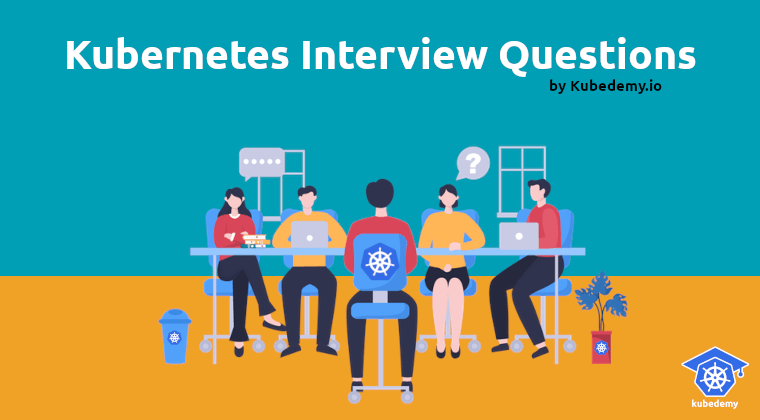
Kubernetes Interview Questions – Part 3 – 20 October 2023
Are you looking for somewhere to learn more about Kubernetes interview questions? You’re in the right place! We publish a Kubernetes question every day on our social media channels, LinkedIn, Telegram, and YouTube, and at the end of the week, we provide the correct answers with details here. If you want to test your Kubernetes knowledge or prepare yourself for Kubernetes role interviews, follow our social media.
Follow our social media:
https://www.linkedin.com/in/ssbostan
https://www.linkedin.com/company/kubedemy
https://www.youtube.com/@kubedemy
Kubernetes Interview Questions:
16 October 2023:
Three kube-apiservers are in place; how many are available simultaneously?
- A) All of them are operational simultaneously
- B) An odd number of them are operational simultaneously
- C) An even number of them are operational simultaneously
- D) One of them is only operational
The kube-apiserver is a fully stateless service which can be scaled as much as we want. Its job is to get the requests and persist them in the etcd database. If you deploy more than one instance of kube-apiserver, all of them are operational and can accept requests and send them to the etcd without being dependent on others.
17 October 2023:
Three kube-controller-managers are in place; how many are available simultaneously?
- A) All of them are operational simultaneously
- B) An odd number of them are operational simultaneously
- C) An even number of them are operational simultaneously
- D) One of them is only operational
The kube-controller-manager service uses a leader-election algorithm, which means if you have more than one instance, only one of them can be elected as a leader, and the leader is the only one who can operate. Other instances will be in standby mode, “they can’t operate or manage anything” until being elected.
18 October 2023:
Three kube-schedulers are in place; how many are available simultaneously?
- A) All of them are operational simultaneously
- B) An odd number of them are operational simultaneously
- C) An even number of them are operational simultaneously
- D) One of them is only operational
Again, the kube-scheduler service uses a leader-election algorithm, which means if you have more than one instance, only one of them can be elected as a leader, and the leader is the only one who can operate. Other instances will be in standby mode, “they can’t operate or manage anything” until being elected.
19 October 2023:
What happens to the Kubernetes cluster if the etcd database loses its quorum (only 1 of 3 instances is available, and the others are down)?
- A) Cluster will be completely non-operational. kube-apiserver cannot provide any response. Pods and containers will be stopped.
- B) Cluster will be completely non-operational. kube-apiserver cannot provide any response. Already created Pods and containers remain running.
- C) Cluster will be semi-operational. kube-apiserver will be read-only. Pods and containers will be stopped.
- D) Cluster will be semi-operational. kube-apiserver will be read-only. Already created Pods and containers remain running.
If, for any reason, the etcd database loses its quorum, “less than 51% instances are available”, the Kubernetes cluster will go out of reach. None of the components can do anything, and kube-apiserver returns etcd timeout error, but all the already-running Pods and containers remain running; they may also face errors and timeouts.
20 October 2023:
What is Admission Controller?
- A) Piece of code to extend kube-apiserver Authentication mechanism
- B) Piece of code to extend kube-apiserver Authorization mechanism
- C) Piece of code to intercept requests to kube-apiserver before Auth mechanism
- D) Piece of code to intercept requests to kube-apiserver after Auth mechanism
Admission Controllers are pieces of code “applications written externally, outside the kube-apiserver core” attached to the kube-apiserver to intercept incoming requests and extend the kube-apiserver functionality for validating and/or mutating requests. They will be run/called after the request is being authenticated and authorized.
https://kubernetes.io/docs/reference/access-authn-authz/admission-controllers
Conclusion:
Kubernetes itself is wild. Man vs. Wild in interviews needs deep knowledge, hands-on experience and additional skills to pass. If you want to pass Kubernetes role interviews, read more and do many more with Kubernetes. Our goal in Kubedemy is to help you understand and solve Kubernetes difficulties in all situations.
If you like this series of articles, please share them and write your thoughts as comments here. Your feedback encourages me to complete this massively planned program.
Follow my LinkedIn https://www.linkedin.com/in/ssbostan
Follow Kubedemy LinkedIn https://www.linkedin.com/company/kubedemy
Follow Kubedemy Telegram https://telegram.me/kubedemy

